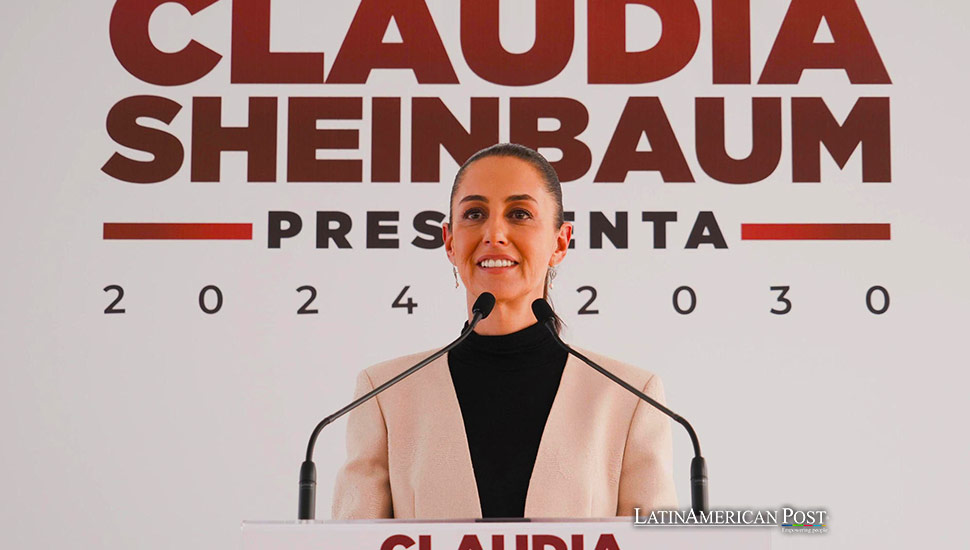Mexico’s President-elect Claudia Sheinbaum Promises No New Taxes

Claudia Sheinbaum, Mexico’s President-elect, assures the general population that there will be no new taxes while committing to infrastructure investments and minimum wage increases. Her administration plans to maintain social welfare programs and focus on efficient fiscal management.
Claudia Sheinbaum, who recently won a landslide victory in Mexico’s presidential election, has laid out her economic vision for the country. In her first major press conference since the election, Sheinbaum emphasized her administration’s commitment to maintaining social welfare programs, boosting infrastructure projects, and increasing the minimum wage without raising taxes for the general population. This vision holds the promise of a more prosperous and equitable future for Mexico and the Latin American region.
Sheinbaum, who will take office in October, reassured citizens that the financial strategies initiated by her predecessor, President Andres Manuel Lopez Obrador, would continue. “Without deep fiscal reforms, one can, with current income, reorientate spending to where it is needed,” she stated. Her comments focus on efficient budget management rather than introducing new tax burdens.
Infrastructure and Minimum Wage Boosts
A significant part of Sheinbaum’s strategy involves continued investment in major infrastructure projects. These projects are crucial for fostering economic growth and development in various regions across Mexico. The President-elect underscored that these investments would be financed without resorting to new taxes. Instead, her administration plans to optimize revenues and reallocate resources to high-impact areas.
Additionally, Sheinbaum highlighted her commitment to increasing the minimum wage. This move aims to improve the living standards of Mexico’s working class and reduce income inequality. Sheinbaum hopes to stimulate domestic consumption and economic activity by boosting the minimum wage.
Despite these assurances, the financial markets responded with caution. Following Sheinbaum’s comments, the Mexican peso dropped 1.3% against the dollar. This reaction reflects market uncertainties about the new administration’s fiscal policies and their potential economic impact.
Social Welfare Programs and Fiscal Strategy
Continuing the social welfare expansions initiated by Lopez Obrador is another cornerstone of Sheinbaum’s economic plan. These programs have been instrumental in supporting Mexico’s most vulnerable populations, providing essential services and financial aid. Sheinbaum guaranteed the continuation of these programs, emphasizing their role in social stability and poverty reduction.
“Maintaining and enhancing social welfare programs is crucial for our administration,” Sheinbaum asserted. She believes that the government can support these initiatives with strategic fiscal management without requiring additional tax revenue. This approach involves identifying inefficiencies in current spending and reallocating funds to priority areas, providing a sense of reassurance about the government’s financial decisions.
Sheinbaum’s commitment to avoiding significant fiscal reforms while maintaining robust social programs demonstrates a careful balancing act. She aims to sustain public support by preserving popular initiatives while ensuring fiscal responsibility. However, this strategy also raises questions about long-term sustainability and potential budgetary pressures.
Sheinbaum’s presidency begins at a politically charged moment, with her ruling Morena party securing a super-majority in the lower house and nearing one in the Senate. This strong legislative position enables the administration to pursue constitutional reforms, though it also comes with significant challenges.
One of the most controversial proposals is Lopez Obrador’s judicial reform, which seeks to elect judges by popular vote. Critics argue that this could undermine judicial independence and lead to political influence over the judiciary. Sheinbaum’s administration must navigate these political tensions carefully, balancing reform ambitions with maintaining democratic checks and balances.
Looking ahead, Sheinbaum addressed the upcoming review of the United States-Mexico-Canada Agreement (USMCA) scheduled for 2026. She predicted that the review would involve minor adjustments rather than substantial changes. This review represents a critical test for Sheinbaum’s government, especially considering the potential political climate in the United States if former President Donald Trump wins the election in November.
The USMCA, a key trade agreement, significantly influences Mexico’s economic landscape. Ensuring stability and favorable terms in the review will be vital for Mexico’s financial interests. Sheinbaum’s administration must engage diplomatically and strategically with the U.S. and Canada to secure beneficial outcomes. The review’s implications for Mexico’s trade balance, economic growth, and regional trade dynamics are significant and will be closely monitored by Latin American nations.
Latin American Context and Regional Implications
Sheinbaum’s policies and leadership style are significant for Mexico and have implications for the broader Latin American region; as one of the leading economies in Latin America, Mexico’s economic policies and political stability influence regional dynamics. Sheinbaum’s emphasis on social welfare, infrastructure development, and fiscal prudence aligns with broader regional trends, where many countries are grappling with similar challenges.
Latin American nations closely watch Sheinbaum’s approach to maintaining social programs without increasing taxes. Her success could be a model for other countries facing fiscal constraints and social demands. Moreover, Mexico’s political stability under Sheinbaum’s leadership is crucial for regional economic cooperation and integration. Her administration’s ability to balance social welfare, infrastructure development, and fiscal responsibility without raising taxes could set a positive example for other countries in the region, fostering greater cooperation and integration.
Sheinbaum’s stance on the USMCA review is particularly relevant for Latin America, highlighting the interconnectedness of trade agreements and economic policies. The outcome of this review will impact not only Mexico but also its trade partners and regional trade dynamics, underscoring the broader implications of this trade agreement for the Latin American region.
Also read: Sheinbaum’s Judicial Reform Sparks Debate and Market Reactions in Mexico
Claudia Sheinbaum’s presidency marks a new chapter for Mexico, characterized by a commitment to social welfare, infrastructure development, and fiscal responsibility. Citizens and international observers will closely monitor her administration’s ability to balance these priorities without raising taxes. The broader implications for Latin America underscore the importance of Mexico’s stability and economic strategies in shaping regional trends and cooperation. As Sheinbaum prepares to take office, her leadership will be pivotal in navigating the challenges and opportunities ahead for Mexico and the Latin American region.





